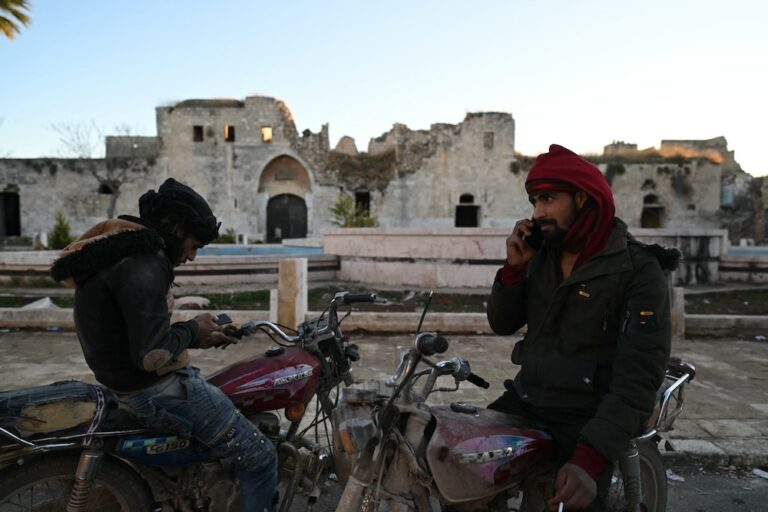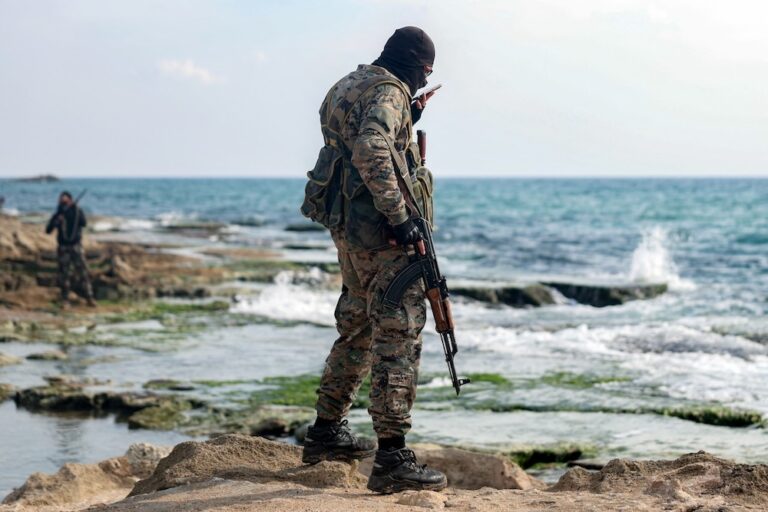Ali Mahmoud Othman, a Homs-based citizen journalist, was arrested in Aleppo and Noura Al-Jizawi, an activist working for opposition media, has gone missing in Damascus; a number of other journalists are also missing.
(RSF/IFEX) – Reporters Without Borders is extremely concerned for the lives of Ali Mahmoud Othman, a Homs-based citizen journalist who was arrested on 28 March in Aleppo, and Noura Al-Jizawi, a woman activist working for opposition media who was abducted by the security services the same day in Damascus.
“Citizen journalists whose only crimes are to have witnessed, filmed and photographed acts of violence by a regime that persists in its deadly folly are being hunted down, arrested, tortured and murdered,” Reporters Without Borders said. “These resistance figureheads defy every kind of danger to thwart the regime’s news blackout about the horrors of the repression in Syria.
“We hold the Syrian authorities responsible for whatever may happen to them. The regime is more determined than ever to suppress all information about its crackdown. Syria has become a hell for both professional and citizen journalists.”
One of the most activist citizen journalists in the Homs region, Othman, 34, was transferred to Damascus two days after his arrest by the intelligence services in Aleppo. It is feared that he has been badly tortured, British photographer Paul Conroy said during a TV interview on 31 March, adding that the British foreign secretary had raised his case with the Syrian authorities.
Nicknamed “Al-Jed” (“Grandfather” in Arabic), Othman was one of the people running the makeshift Media Centre in the Homs district of Baba Amr. A vegetable street trader until the uprising, he obtained a video camera and began filming the protests in Homs and the ensuing government shelling of the centres of resistance in order to document everything that was happening.
A key contact for foreign journalists, he was of enormous help when Conroy, French journalists Edith Bouvier and William Daniels and Spanish journalist Javier Espinosa were trapped in Baba Amr after the shelling of the Media Centre on 22 February, and he played a major role in smuggling them out of the city.
As reported at the time, US reporter Marie Colvin and French photographer Rémi Ochlik were killed in the bombardment of the Homs Media Centre.
Noura Al-Jizawi, 24, is a member of the Syrian Revolution General Commission (an opposition coalition) and Flash News Network, and works with the Syrian revolutionary newspaper Hurriyat. When captured in Damascus on 28 March, she was carrying six cameras containing photos and video of demonstrations. Twelve other activists – seven women and five men – have gone missing since then and the list is likely to get longer.
As already reported, two freelance journalists – Walid Blidi, who was British, and Nassim Terreri, whose nationality is still not known – were fatally shot by Syrian soldiers at Darkush, on the border between Syria and Turkey, on 26 March.
Another citizen journalist, amateur photographer Jawan Mohamed Qatna, was abducted from his home in the town of Derbassiyeh, north of the eastern city of Al-Hassakeh, on the evening of 25 March and his body was found a few hours later bearing the signs of torture.
Qatna was active in the Kurdish youth movement and took photos for the Kurdish-led Free Derbassiyeh Coordination Committee. He regularly covered demonstrations in the mainly Kurdish region and supplied photographs to various media organizations. The identity of those responsible for his targeted murder is still not known.
Reporters Without Borders has also learned that Wassim Zakaria Al-Dahan, a journalist working for the newspaper Qassioun, was arrested by intelligence officers in Damascus on 26 March. His family and colleagues have had no news of him since then.
The poet and blogger Dia’a Al-Abdullah has been held since 13 February for posting an open letter to President Bashar Al-Assad on Facebook. Entitled “As a Syrian Citizen I Announce,” it urged Assad to end the bloodshed.
Reporters Without Borders is still without any news of Mohamed Abu Hajar and Jamal Al-Omas, two bloggers and activists who were arrested on 14 and 15 March respectively.
Similarly, no information is available about the following three people who were arrested together in the capital on 7 March – Yara Michael Shamas, an information technology specialist; Jehad Jamal, a blogger also known as Milan; and Etab Labbad, a 20-year-old journalism student who has worked with various newspapers and websites such as Kassioun and Baladna.
Rudy Othman, a lawyer and blogger arrested in Damascus on 15 March, has been released.
The authorities are still holding eight of the 16 people who were arrested during a 16 February raid on the Syrian Centre for Media and Freedom of Expression. They are Mazen Darwish (the head of the centre), Hussein Gharir, Hani Zitani, Joan Fersso, Bassam Al-Ahmed, Mansour Al-Omari, Abdel Rahman Hamada and Ayham Ghazzoul. They have reportedly begun a hunger strike. Reporters Without Borders reiterates its call for their release.
There is still no news of two Turkish journalists – Adem Özköse, a reporter for the magazine Gerçek Hayat and the daily Milat, and cameraman Hamit Coşkun – who were abducted by Shabiha militiamen near the northwestern city of Idlib on 10 March and then handed over to members of the Syrian intelligence services.
The following is a partial list of journalists and netizens who are still detained or whose current whereabouts and status is unknown. It was prepared with help from the Syrian Centre for Media and Freedom of Expression:
– Said Dairky, an engineer employed by the national TV station who was arrested on 14 January.
– Alaa Shueiti, a cyber-activist arrested on 15 October in Homs.
– Mos’ab Massoud, a journalist with Addounia, who was arrested on 1 October after posting an article on Elaph headlined “The ministry of media and information and the question of sectarianism.”
– Firas Fayyad, a filmmaker who was arrested on 1 December at Damascus airport as he was about to fly to Dubai.
– Bilal Ahmed Bilal, a Falesteen TV producer who was arrested in the Damascus suburb of Mo’adamieh on 13 September.
– Abdelmajid Rashed Al-Rahmoun, who was arrested on 23 August in Hama.
– Tarek Said Balsha, a photographer arrested in Latakiya on 19 August. There has been no news of him since then.
– Mohamed Nihad Kurdiyya, a mechanical engineer who was arrested in Latakiya on 18 August as he was about to be interviewed by Al-Jazeera.
– Abdelwalid Kharsah, a reporter who was arrested while covering demonstrations in Deraa on 17 August.
– Olwan Zouaiter, a journalist who has written for many Lebanese dailies. He was arrested by intelligence officials in the northern city of Raqqah on 16 March after returning from Libya. He was initially sentenced to five years in prison for allegedly contacting the Syrian opposition while abroad. The sentence was subsequently reduced to 13 months. He is serving it in Raqqah prison.
According to rumours circulating since 10 February, Hussein Issou, a writer and opposition activist who was arrested in the northeastern city of Al-Hassakah on 3 September, died in detention and his body was taken to the morgue of the military hospital in Damascus. A war of information or disinformation has been waged about his fate. Reporters Without Borders has urged the Syrian authorities to shed light on his status. His family has been told nothing.
Meanwhile, Moheeb Al-Nawathy, a Palestinian journalist and a Fatah member who used to work for the website of the satellite TV station Al-Arabiya, has been missing since 5 January 2011, nine days after his arrival in Damascus. He had been living in Norway since 2007.
And Tal Al-Mallouhi, a 21-year-old student and blogger, has been detained since December 2009. She was brought before a state security court in Damascus for the second time on 17 January 2011. Reportedly accused of spying for the United States, she is being held in Duma prison, near Damascus. Internet users all over the world have been calling for her release.


